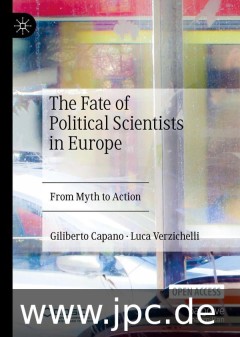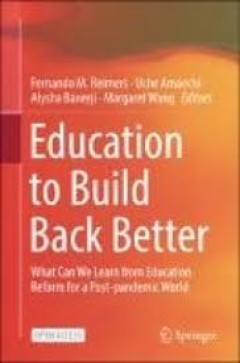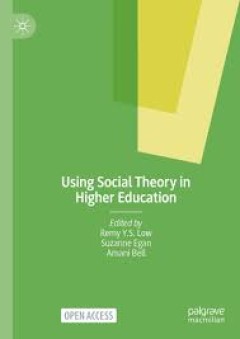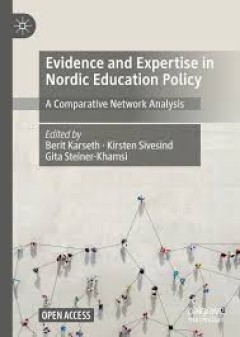Filter by

The Fate of Political Scientists in Europe
This open access book offers a systematic survey of the attitudes and values of European political scientists. It builds a structural interpretation based on empirical data, as well as offering reflections on the future structure of the discipline. In the middle of a delicate phase of changes marked by the effects of pandemic and the war in Ukraine, we need to pay attention to the factors that …
- Edition
- 1
- ISBN/ISSN
- 978-3-031-24643-2
- Collation
- XXI, 178
- Series Title
- -
- Call Number
- -

Higher Education in Romania: Overcoming Challenges and Embracing Opportunities
Romanian education policy was notoriously plagued by instability and a tendency to escape the normal policymaking cycle via top-down highly politicised reforms. After almost three decades, a new initiative by the President of Romania attempts to promote a more inclusive style of policymaking that would ensure wider societal support to upcoming educational reforms. The purpose of this articl…
- Edition
- -
- ISBN/ISSN
- 9783030944964
- Collation
- VIII, 274
- Series Title
- -
- Call Number
- -

Education to Build Back Better
This chapter examines the Multi-Skill Foundation Course (MSFC), a vocational course conceived by grassroots NGO Vigyan Ashram, and further developed, replicated, and scaled up by Lend-A-Hand India (LAHI) since 2005. In collaboration with the State Government of Maharashtra, the course has been recognized under the National Skills Qualification Framework (NSQF)) and adopted by more than 600…
- Edition
- -
- ISBN/ISSN
- 9783030939519
- Collation
- VI, 204
- Series Title
- -
- Call Number
- -

Sozioanalyse in der pädagogischen Arbeit : Ansätze und Möglichkeiten zur B…
Sabrina Rutter zeigt in dieser Open-Access-Publikation auf, inwiefern handlungsleitende Orientierungen von Lehrkräften in der Schule ungleichheitsrelevant werden und mit habitus- und milieuspezifischen Logiken zusammenhängen. Ansätze und Möglichkeiten der Ungleichheitsreduzierung werden auf Grundlage des Sozioanalysekonzeptes von Pierre Bourdieu diskutiert. Die Autorin liefert wichtige Hinw…
- Edition
- -
- ISBN/ISSN
- 978-3-658-32065-2
- Collation
- XXI, 235
- Series Title
- Bildung und Gesellschaft (BILDUNGUG)
- Call Number
- -

Media-Related Out-of-School Contact with English in Germany and Switzerland: …
This open access book aimes to close a critical research gap in understanding how frequently German-speaking adolescents come into contact with the English language through various media channels, such as television, books, or the internet, and how this contact influences learners’ English competences. In addition, this research project explores the effect of family background and gender on…
- Edition
- -
- ISBN/ISSN
- 9783658424084
- Collation
- XIV, 214
- Series Title
- -
- Call Number
- -

Using Social Theory in Higher Education
This open access book offers a unique and refreshing view on working with social theory in higher education. Using engaging first-person accounts coupled with critical intellectual analysis, the authors demonstrate how theory is grappled with as part of an ongoing practice rather than a momentary disembodied encounter. In a structure that creates a space for relational dialogue, each chapter is…
- Edition
- -
- ISBN/ISSN
- 9783031398179
- Collation
- XIV, 284
- Series Title
- -
- Call Number
- -

Evidence and Expertise in Nordic Education Policy
Te idea of applying comparative methods of inquiry to understand reforms that travel, which is presented in this volume, was conceived in 2017 within the context of the Policy Transfer Project (POLTRANS). In this project Gita Steiner-Khamsi, Teachers College (TC), Columbia University, was appointed as a part-time adjunct visiting professor at the Department of Education, University of…
- Edition
- -
- ISBN/ISSN
- 9783030919597
- Collation
- XXIV, 429
- Series Title
- -
- Call Number
- -

Anerkennungsverhältnisse in der Schule : Empirische Untersuchungen im Kontex…
In diesem Open-Access-Buch werden rekonstruierbare Normen zur Diskussion gestellt, innerhalb derer Kinder zu Kindergarten- und Schulkindern werden und die in der Regel nicht reflexiv zugänglich sind. Um herauszufinden, welche Anerkennungsverhältnisse sich zwischen Lehrpersonen und Kindern im Kindergarten manifestieren, wurden videografierte Interaktionen während der sogenannten Auffangzeit u…
- Edition
- -
- ISBN/ISSN
- 978-3-658-46176-8
- Collation
- XXV, 298
- Series Title
- Kinder, Kindheiten und Kindheitsforschung (KKK, volume 33)
- Call Number
- -

Hochschulreformen, Leistungsbewertungen und berufliche Identität von Profess…
In diesem Open-Access-Buch wird ein differenziertes Bild der Folgen von „Bologna“, „Exzellenzinitiative“, Drittmittelwettbewerb und „New Public Management“ für die berufliche Identität von Professor*innen gezeichnet. Eine qualitative empirische Studie zeigt, dass die mit diesen Reformen verbundenen Leistungsbewertungen nicht nur Identitätsbedrohungen mit sich bringen müssen, son…
- Edition
- -
- ISBN/ISSN
- 978-3-658-33289-1
- Collation
- VII, 386
- Series Title
- Organization & Public Management (OPM)
- Call Number
- -

Fortbildungen für KulturSchule: Wie Kulturelle Bildung in die Schule kommt
In diesem Open-Access-Buch gibt eine Evaluationsstudie Auskunft, wie teilnehmende Lehrkräfte Fortbildungen erleben, die auf die KulturSchul-Entwicklung zielen. Welche Perspektiven bauen diese auf? Und welche internen Unterstützungsmaßnahmen trifft die Schule, damit sich die Lernkultur ändern kann? Die Fortbildungsreihen im Landesprogramm «KulturSchule Hessen» legen die Grundlage daf�…
- Edition
- -
- ISBN/ISSN
- 9783658422219
- Collation
- XI, 243
- Series Title
- -
- Call Number
- -
 Computer Science, Information & General Works
Computer Science, Information & General Works  Philosophy & Psychology
Philosophy & Psychology  Religion
Religion  Social Sciences
Social Sciences  Language
Language  Pure Science
Pure Science  Applied Sciences
Applied Sciences  Art & Recreation
Art & Recreation  Literature
Literature  History & Geography
History & Geography